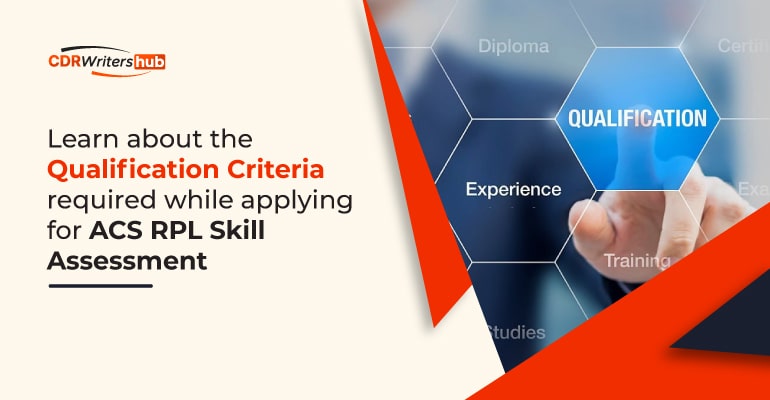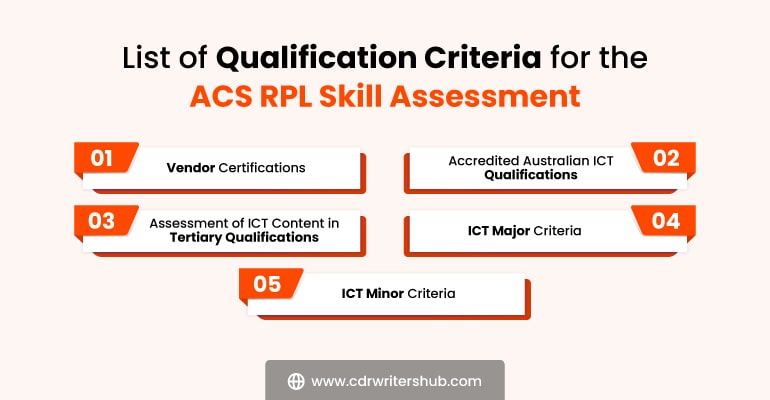What are the qualification criteria required while applying for ACS RPL skill assessment?

What are the qualification criteria required while applying for ACS RPL skill assessment?
Professionals in information and communication technology (ICT) who wish to relocate to Australia can apply for permanent residency online. They must undergo a skilled evaluation to do so. Depending on your qualification, you can take one of several evaluation paths. The Australian Computer Society has the authority to evaluate the abilities of candidates. The ACS organization’s primary goal is to find people working in the ICT industry who have the necessary skills and certifications and are motivated to relocate to Australia for a brighter future.
Applicants who have tertiary credentials with little or no ICT content or have no recognized tertiary qualifications should use the RPL application process.
1. To fulfill the eligibility criteria, you’ll need 6 years of relevant work experience accomplished at any point in your previous work history and an acceptable Recognition of Prior Learning (RPL) application if your diploma is an AQF Diploma or higher with inadequate ICT content.
2. If you don’t have a recognized higher education, you’ll need 8 years of relevant work experience and a successful Recognition of Prior Learning (RPL) application to fulfill the suitability requirements.
Within an RPL application, you must show how you gained your ICT skills and submit two project reports. RPL Instructions for the ACS Recognized Prior Learning Form
Each report must include a clear explanation of a professional event in your work history and sufficient evidence of using the stated ICT expertise in a working environment. Projects must be relevant to the job being evaluated. One must apply to a project done within the last three (3) years, while the other must apply for work finished within the previous five (5) years. You must provide sufficient detail to define the scope and depth of your ICT experience gained throughout your ICT career.
The Recognition of Prior Learning Project Report should be the applicant’s original work, not that of another person or a hired writer. The ACS maintains the right to check your proposed work to match published sources or other submitted applications using software programs. In certain situations, plagiarism detection systems may require you to re-submit project reports and other written material provided with the application.
All cited or paraphrased content must be explicitly referenced in the Project Report, with all sources recognized. Failure to reveal any information in the Project Report which is not your original will result in an unacceptable assessment.
Qualifications criteria
Table of Contents
An Applicant’s qualification must fit within a broad definition of ICT, defined as a profession trusted by society for conceiving, creating, implementing, maintaining, managing, and disposing of ICT infrastructure, products, processes, and services in a broad professional environment. One of the key objectives is to prepare students to work as ICT experts.
For individuals applying for an Australian Skilled Migration Visa, the ACS Skill Assessment is a must. Before applying for ACS Skill Assessment, candidates must meet a variety of qualifying categories and eligibility requirements and criteria. The applicant’s experience and skills should adequately align with the qualification attained. The candidate’s ambition is to reside in Australia and work there permanently.
List of qualification criteria for the ACS RPL skill assessment
Vendor certifications
Vendor certifications do not come under ACS assessment anymore. Only RPL candidates are urged to provide proof of any completed vendor certifications to demonstrate the knowledge in their selected ANZSCO occupation code.
Accredited Australian ICT qualifications
The ICT Major Criteria are commonly met by Australian credentials recognized by the ACS. Please keep in mind that this does not ensure that the qualification will be considered closely connected to the ANZSCO occupation.
Assessment of ICT content in tertiary qualifications
Computing qualifications are classified as either ICT Major or ICT Minor. Non-ICT qualifications are those with less than a modest amount of ICT content.
ICT major criteria
(a) Bachelor’s degree level: A conventional three-year Bachelor’s degree is considered a major in computing if at least 33% of the qualification is in ICT. Longer-duration qualifications are evaluated to the equivalent of a 3-year AQF Level 7 (Bachelor) award.
(b) Diploma, Advanced Diploma, or Associate Degree Level: If at least 50% of a diploma, advanced diploma, or associate degree certificate includes ICT, it is considered to have a major in computing.
(c) Level of Postgraduate Qualification: A 2-year postgraduate qualification (such as a Graduate Diploma or Masters’s) that does not need a Bachelor’s degree with an ICT major for entrance is considered to have a major in computing if at least 50% of the qualification includes ICT. Qualifications are evaluated to the level of a two-year AQF Level 8 or above award. A postgraduate degree in Australia with only 12 topics must have at least 67% ICT content.
Australian postgraduate qualifications must contain the following:
- A minimum of 3 semesters or 1.5 years of full-time study
- A minimum of 2 semesters or 1 year of full-time equivalent ICT content is required
- A minimum of 12 units or topics are required for postgraduate credentials in Australia.
A postgraduate qualification (Graduate Diploma, Master, or Doctoral degree) that requires at least a Bachelor’s degree with a major in ICT for admittance must include at least 33% ICT content, all of which must be at the postgraduate level.
ICT Minor Criteria
When the ICT content of a Bachelor’s or higher qualification accounts for at least two-thirds of the criteria for a major, it is classified as a Minor.
Insufficient ICT content: Non-ICT qualifications have less than the minimum ICT content required for a Minor.
Closely connected ICT content criterion: To achieve the appropriateness criteria, at least 65 percent of ICT material in all educational degrees must be closely associated with adequate core content to the selected occupation (ANZSCO).
The names of all the topics studied and the marks or grades earned must be listed on the statement of academic record or transcript. Please remember that ACS does not accept result slips or online results as acceptable proof. If necessary, attach a legend or key outlining the grading system to aid in the clarification of information.
If an Applicant has completed a qualification but has not yet received a Graduation Certificate, please submit an official document that specifies the date you completed all course prerequisites and were eligible to get the certificate.
The name of the university, the publishing date or completion date of the thesis or project, as well as the proportion (percent) and type of ICT material relevant to your preferred ANZSCO should all appear on the first page of the abstract.
Requirements specific to each region are as follows:
- Bologna Agreement: Please submit the Diploma Supplement if you qualify as a signatory nation to the Bologna Agreement.
- People’s Republic of China (PRC); if appropriate, please supply the graduation diploma and certificate of the award by PRC academic degree requirements.
- Pakistan: Please submit the award certificate and entire academic transcript, together with attestation from the Higher Education Commission of Pakistan.
- Philippines: If available, please provide proof of passing the Professional Regulation Commission’s Licensure Examinations.
- Seoul Accord; The Seoul Accord is a multilateral agreement between nations that permits the signatories to accept specific bachelor’s and master’s degrees earned at universities worldwide. Since its founding in 2008, ACS has been a signatory to the Seoul Accord. To assess migration skills, qualifications recognized under the Seoul Agreement may be regarded to have satisfied the ICT main requirements.
Why choose us for the ACS RPL assessment?
With CDRWritersHub, we always aim for excellence, and we make sure that each report we prepare is genuine. EA-approved CDR and RPL reports, as well as 100% plagiarism-free writing, are available. We have plagiarism-checking software to ensure your 100% originality. To avoid CDR rejection from the EA, we provide the service of reviewing the CDR Report.




